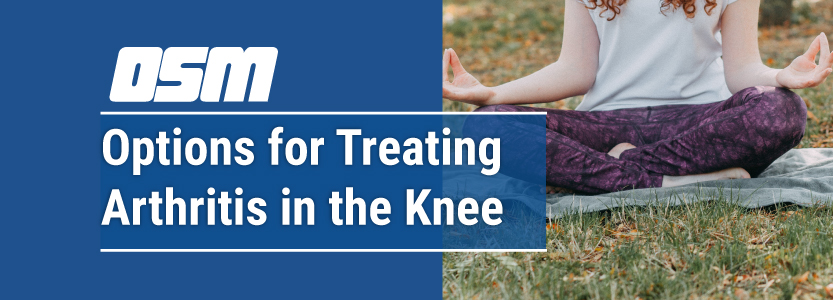Options for Treating Arthritis in the Knee
Article featured on The Noyes Knee Institute
Knee osteoarthritis can occur when the cartilage around the knee wears down. Without the protection of cartilage, bones in the joint grind together, causing inflammation and pain. In severe cases, a knee surgeon might recommend knee replacement or arthroscopic surgery. Fortunately, many non-invasive options help relieve the pain of arthritis in the knee.
Osteoarthritis and Rheumatoid Arthritis: What’s the Difference?
Knee osteoarthritis is a progressive condition in which the subchondral bone suffers damage as the cartilage slowly wears away. This type of arthritis is common in middle-aged and elderly patients and happens more frequently in females than males.
Rheumatoid arthritis (RA) is a disorder of the autoimmune system which leads to chronic inflammation. RA usually presents in both knees at the same time. Other joints, including fingers, toes, ankles, and wrists may also be affected.
Both types of arthritis respond to the conservative treatments listed below. However, as an auto-immune disorder, RA also requires specific medical care.
Treatments for Arthritis in the Knees
Weight Loss
For every pound of weight lost, you relieve four to six pounds of pressure from the knee. Carrying a significant amount of extra weight puts extra strain on knee joints which aggravates arthritis symptoms. However, even if you are not obese, losing just five to ten pounds could significantly relieve arthritis pain.
Avoid Aggravating Activities
While it’s important to continue exercising and moving your knees, overdoing it can make problems worse. Avoid the following activities if you notice pain or swelling up to 24 hours after participation:
- High-impact exercise/sports
- Kneeling/squatting
- Walking for periods longer than 60-90 minutes without a rest break
- Using stairs (inclining or declining)
- Sitting in one position for more than 30 minutes without a break (such as during a long drive)
- Standing for periods longer than 30-60 minutes
It may not be practical to avoid all of these activities every day, but reducing them as much as possible should help alleviate arthritis knee pain.
Anti-Inflammatory Medications
NSAIDs can be extremely helpful in easing arthritis pain. However, it’s important to use prescription or over-the-counter anti-inflammatory medications only as recommended by your physician. Overuse can cause serious side effects.
Knee Injections
Steroid or synthetic lubricant injections such as Synvisc may be recommended when diet and other lifestyle changes are ineffective.
Physical Therapy
Physical therapy and “knee-friendly” exercises are often recommended to help regain strength and flexibility in the knee joint.
Knee Surgery
When conservative methods fail, it may be time to consider knee surgery. Many people automatically think of total knee replacement when they think of surgery for treating knee arthritis, but there are several other surgical options to consider:
- Arthroscopic debridement, abrasion arthroplasty
- Autologous chondrocyte implantation
- Femoral osteotomy
- High tibial osteotomy
- Meniscus transplantation
- Osteochondral autograft transfer
- Partial knee replacement
You and your knee surgeon will determine the surgical option that’s best for your situation. If you have sustained additional knee injuries, other procedures may be performed simultaneously as surgery to correct arthritis.
Should I see a Knee Surgeon?
If you have tried conservative therapies, but your arthritis pain continues to get worse, it may be time to consider surgery.
The Orthopedic & Sports Medicine Center of Oregon is an award-winning, board-certified orthopedic group located in downtown Portland Oregon. We utilize both surgical and nonsurgical means to treat musculoskeletal trauma, spine diseases, sports injuries, degenerative diseases, infections, tumors and congenital disorders.
Our mission is to return our patients back to pain-free mobility and full strength as quickly and painlessly as possible using both surgical and non-surgical orthopedic procedures.
Our expert physicians provide leading-edge, comprehensive care in the diagnosis and treatment of orthopedic conditions, including total joint replacement and sports medicine. We apply the latest state-of-the-art techniques in order to return our patients to their active lifestyle.
If you’re looking for compassionate, expert orthopedic surgeons in Portland Oregon, contact OSM today.
Phone:
503-224-8399
Address
17355 Lower Boones Ferry Rd Suite 100A
Lake Oswego, OR 97035
Hours
Monday–Friday
8:00am – 4:30pm



